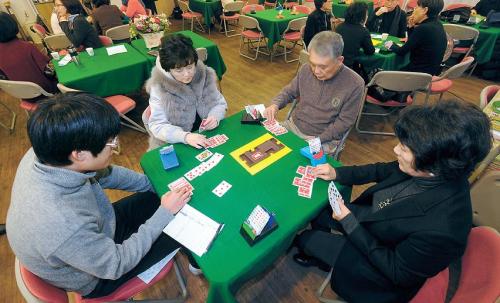Enthusiasts enjoy social, mental benefits of old pastime
On a cold afternoon inside an old building in southern Seoul, a group of people are playing cards. People of all ages cluster round square tables and chairs in a small room.
At each table, four people sit silently, staring at their cards.
“We play bridge here almost every day,” says Choi An-hee, chairwoman of Korea Contract Bridge League.
Bridge is a trick-taking card game using a standard deck of 52 cards. It is played by four players with two people sitting across each other playing as a team.
Each player receives 13 cards and teams try to win as many tricks as possible. Players each lay a card, which should be in the same suit as the first card. The one who plays the highest card in the suit wins the trick.
Many people here might not familiar with bridge, but it is a classic card game enjoyed by all ages and walks of life ― from multi billionaires Bill Gates and Warren Buffett to tennis star Martina Navratilova.
Buffett once described it as “such a sensational game that I wouldn’t mind being in jail if I had three cellmates who were decent players.”
“Everyone can play it, even old people like me also can play it as long as you have the strength to hold your cards,” says Choi, 68.
It’s not easy to see old and young, men and women sharing a pastime these days, but with bridge everyone can have a great time together, she claims.
The problem is, however, it takes a great deal of time to understand the basics. Bridge is considered the most challenging card game ever invented.
“For me, it took almost six months to be able to sit down and play with other players,” Choi says.
The possibilities, she explains, are almost limitless, hence the great complexity of the game.
 |
Members of Korea Contract Bridge League play bridge at the league office in southern Seoul. (Lee Sang-sub / The Korea Herald) |
So why do people want play such a complicated game? It’s because it does not depend on luck or the cards one draws, but on the knowledge and the expertise of the players, Choi explains.
“You will almost never see the same bridge hand twice, but that’s why people like it so much,” she adds.
Kim Soo-dong, 63, a former Korean ambassador to Canada, says he got “hooked” after playing it with his foreign friends.
A few bridge enthusiasts who, like Kim, had played the game overseas, introduced the game here in the early 1990s.
Since its establishment in 1993, the Korea Contract Bridge League has been the official representative organization to the World Bridge Federation.
The KCBL is also a member of the Pacific Asia Bridge Federation, which includes countries such as China, Japan, Australia, New Zealand, Malaysia, Singapore and Thailand.
According to Choi, the KCBL has around 400 active members with an additional 2,000 members who also play it on websites such as www.bridgebase.com.
The number of members, she admits, remains small compared to neighboring countries, such as Japan with more than 7,000 registered members.
But the bridge population is slowly on the rise and an increasing numbers of young people enjoy the game, according to the chairwoman of KCBL.
Choi Sang-ho, 37, who’s been playing bridge nearly 10 years, says he first started playing after reading Agatha Christie’s “Cards on the Table.”
“After reading the book, I really wanted to play it, so I started it online,” Choi says.
The KCBL currently hosts bridge games almost every day at its office in Sinsa-dong, southern Seoul, and there are special tournaments throughout the year.
“There are usually two sessions on each day, at 10 a.m. and 2 p.m. With a joining-fee of 10,000 won ($9), you can enjoy a day of bridge,” she added.
Bridge has also been taught at Myongji University as a part of its baduk studies course since 2007, and beginners’ bridge classes are now available at cultural centers at various department stores, including Hyundai and Shinsegae, across Seoul.
Kim Dae-hong, a 21-year-old student, says he first played bridge at Myongji University and has never stopped.
Kim had his first international play in the Asia Pacific Bridge Federation Championship in June 2011 in Kuala Lumpur, where he found a huge gap with the world’s top players.
“Many people still think it’s a pastime for the old, but I think it’s a really exciting game for all,” Kim adds noting that he is hoping to see more youngsters join him in the Korean national bridge team.
“To be honest, the current level of Korean bridge is like Korea’s first World Cup in 1954, where the team lost 9-0. But we’re working hard to find more young players and promote the game,” says Choi.
The wonderful thing about bridge, Choi says, is that “You won’t have to sit alone. You meet different people through the game.”
“And there is always something to learn in bridge. It keeps my mind alert,” she adds.
For information about bridge groups and lessons at KCBL Center, call (02) 3445-3847 or visit at www.kcbl.org.
By Oh Kyu-wook (
596story@heraldcorp.com)







![[Weekender] Korea's traditional sauce culture gains global recognition](http://res.heraldm.com/phpwas/restmb_idxmake.php?idx=644&simg=/content/image/2024/11/21/20241121050153_0.jpg)
